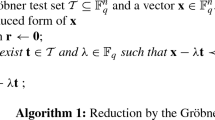Abstract
We give easy proofs of some recent results concerning threshold gaps in ramp schemes. We then generalise a construction method for ramp schemes employing error-correcting codes so that it can be applied using nonlinear (as well as linear) codes. Finally, as an immediate consequence of these results, we provide a new explicit bound on the minimum length of a code having a specified distance and dual distance.
Similar content being viewed by others
Notes
After this paper was submitted for publication, Ronald Cramer informed us (private communication) that he also had a specialised proof of the combinatorial bound; this proof is presented in the updated version of [4].
References
Bierbrauer, J.: Introduction to Coding Theory. Chapman & Hall/ CRC (2005)
Blakley, G.R., Meadows, C.: Security of ramp schemes. Lect. Notes Comput. Sci. 196, 242–268 (1985) (CRYPTO 1984)
Blundo, C., De Santis, A., Vaccaro, U.: Efficient sharing of many secrets. Lect. Notes Comput. Sci. 665, 692–703 (1993) (STACS ’93)
Cascudo, I., Cramer, R., Xing, C.: Bounds on the threshold gap in secret sharing over small fields. Cryptology ePrint Archive: Report 2012/319. http://eprint.iacr.org/2012/319 (2012) [Version 1 is dated June 5, 2012; version 2 is dated Sept. 27, 2012]
Chen, H., Cramer, R.: Algebraic geometric secret sharing schemes and secure multi-party computations over small fields. Lect. Notes Comput. Sci. 4117, 521–536 (2006) (CRYPTO 2006)
Chen, H., Cramer, R., Goldwasser, S., de Haan, R., Vaikuntanathan, V.: Secure computation from random error correcting codes. Lect. Notes Comput. Sci. 4515, 291–310 (2007) (EUROCRYPT 2007)
Dawson, E., Mahmoodian, E.S.: Orthogonal arrays and ordered threshold schemes. Australas. J. Comb. 8, 27–44 (1993)
Delsarte, P.: An Algebraic Approach to the Association Schemes of Coding Theory. Philips Research Reports Supplements (1973)
Delsarte, P.: Four fundamental parameters of a code and their combinatorial significance. Inf. Control 23, 407–438 (1973)
Duursma, I., Chen, J.: Multiplicative secret sharing schemes from Reed–Muller type codes. In: 2012 IEEE International Symposium on Information Theory Proceedings, pp. 264–268
Hedayat, A.S., Sloane, N.J.A., Stufken, J.: Orthogonal Arrays, Theory and Applications. Springer (1999)
Jackson, W.-A., Martin, K.M.: A combinatorial interpretation of ramp schemes. Australas. J. Comb. 14, 51–60 (1996)
Kohnert, A.: Construction of linear codes having prescribed primal-dual minimum distance with applications in cryptography. Albanian J. Math. 2, 221–227 (2008)
Kurihara, J., Uyematsu, T., Matsumoto, R.: Secret sharing schemes based on linear codes can be precisely characterized by the relative generalized hamming weight. IEICE Trans. Fundam. E95-A(11), 2067–2075 (2012)
Kurosawa, K., Satoh, T.: Design of SAC/PC(ℓ) of order k boolean functions and three other cryptographic criteria. Lect. Notes Comput. Sci. 1233, 434–449 (1997) (EUROCRYPT 1997)
van Lint, J.H.: Introduction to Coding Theory, 3rd edn. Springer (1998)
van Lint, J.H., Springer, T.A.: Generalized Reed–Solomon codes from algebraic geometry. IEEE Trans. Inf. Theory 33, 305–309 (1987)
MacWilliams, F.J., Sloane, N.J.A.: The Theory of Error-Correcting Codes. North-Holland (1977)
Martin, K.M., Paterson, M.B., Stinson, D.R.: Error decodable secret sharing and one-round perfectly secure message transmission for general adversary structures. Cryptogr. Commun. – Discrete Structures, Boolean Functions and Sequences 3, 65–86 (2011)
Massey, J.L.: Minimal codewords and secret sharing. In: Proceedings of the 6th Joint Swedish–Russian International Workshop on Information Theory, pp. 276–279 (1993)
Matsumoto, R., Kurosawa, K., Itoh, T., Konno, T., Uyematsu, T.: Primal-dual distance bounds of linear codes with application to cryptography. IEEE Trans. Inf. Theory 52, 4251–4256 (2006)
McEliece, R.J., Sarwate, D.V.: On sharing secrets and Reed–Solomon codes. Commun. ACM 24, 583–584 (1981)
Ogata, W., Kurosawa, K.: Some basic properties of general nonperfect secret sharing schemes. J. Univers. Comput. Sci. 4, 690–704 (1998)
Stinson, D.R., Wei, R.: An application of ramp schemes to broadcast encryption. Inf. Process. Lett. 69, 131–135 (1999)
Sudan, M.: Algorithmic introduction to coding theory. Lecture 21 (2001). http://people.csail.mit.edu/madhu/FT01/scribe/lect21.ps. Accessed 26 Sept 2012
Acknowledgements
We would like to thank Ignacio Cascudo, Ronald Cramer, Ryutaroh Matsumoto and Ruizhong Wei for helpful comments.
Author information
Authors and Affiliations
Corresponding author
Additional information
D. Stinson’s research is supported by NSERC discovery grant 203114-11.
Rights and permissions
About this article
Cite this article
Paterson, M.B., Stinson, D.R. A simple combinatorial treatment of constructions and threshold gaps of ramp schemes . Cryptogr. Commun. 5, 229–240 (2013). https://doi.org/10.1007/s12095-013-0082-1
Received:
Accepted:
Published:
Issue Date:
DOI: https://doi.org/10.1007/s12095-013-0082-1



